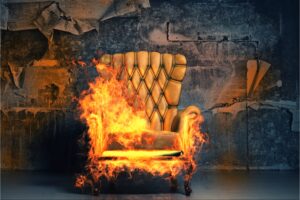Losing your home to a fire is a scary thought, but there are plenty of things you can do to stop a fire before it starts and keep your home and family safe.
Let’s Find out Some Ways to Prevent Common Household Fires:
Faulty Wiring and Outlets Are One of the Top Causes of Household Fires
- Check the electrical cords throughout your home for signs of fraying, and replace all frayed wires.
- Do not pinch or cover electrical cords with items such as rugs.
- Be aware of the capacity of your home’s electrical system. Do not overload your circuits. If you have questions about your home’s electrical system, you may want to consult a licensed electrician.
- Understand the difference between surge protectors and power strips. Both allow you to plug in multiple electronic devices, but only the surge protector will help protect these devices from a power spike. Use surge protectors to protect valuable electronic devices, such as computers and televisions.
Fireplace and Wood Stove Safety
- Have your chimney cleaned twice a year and inspect your flue vents regularly. To prevent creosote from building up in your chimney flue, don’t burn cardboard, trash or greenwood.
- Keep a “Class A” fire extinguisher on hand. Also, make sure smoke alarms and carbon monoxide detectors are installed in the proper locations and test them regularly.
- Don’t use gasoline, charcoal starter fluid or other flammable liquids to start your fire.
- Teach your children to stay clear of hot stoves and burning fires. Never leave young children unattended when you’re operating your fireplace or wood stove.
- Let ashes cool in a metal container before discarding. They can contain live coals.
- Store wood safely away from your wood-burning appliance. Check with your local fire department or wood stove manual for proper clearances.
Dirty Chimneys also Pose a Fire Hazard
- Have your chimney inspected annually by a Chimney Safety Institute of America (CSIA) – certified chimney sweep. Have a professional clean and repair the chimney as needed, especially before the cold months, when you will be using it frequently.
- Use seasoned wood only. Never burn green or damp wood.
- Never burn cardboard boxes, wrapping paper, trash or trees in your fireplace – these can all spark chimney fires.
Carelessness in the Kitchen May also Leads to Household Fires
- Never leave your pots or pans unattended on your stove.
- Keep a kitchen fire extinguisher readily available and know how to use it.
- Keep your stove and oven clean. Built-up food splatter or grease can later ignite when the stove or oven is turned on for cooking.
Recommended Read: Is The Smell Of Smoke After A Fire Harmful?
Fire Safety Tips:
- Have your heating system regularly serviced by a professional, including chimneys from wood-burning fireplaces. Clean around heat sources and keep dust and other flammable items away from ignition sources.
- Remove lint from your dryer filter after every use. A clogged filter and lint trap make your dryer less efficient, reduces the airflow needed to keep heat from building up in vents, and force lint onto the heating coils. Also, never let your dryer run when you’re out of the house or when you’re asleep.
- Keep firewood, piles of leaves and garbage away from the home. If a grass fire starts nearby, these items next to your home could easily become kindling. Never dump hot ashes inside or near your home; keep them in a metal container well away from your house and garage.
- Avoid using outlet extenders or plug-in power bars. They can quickly overload an electrical circuit. Replace old, damaged or frayed appliance cords, and never force a three-pronged plug into a two-slot outlet or extension cord.
- Store containers of cooking oil well away from the stove. When cooking with oil, never leave the stove unattended. To stop a grease fire, turn off the burner and place a lid on the pan to suffocate the flames, or pour on lots of baking soda. Never pour water on a grease fire or try to carry the pan outside; water splatters the grease and makes the fire bigger, and the pan will be much too hot to carry.
- Be sure to properly extinguish smoking materials. Smoking materials that are not properly extinguished can smolder undetected for days before igniting a fire. Never discard smoking materials on the ground or in plant pots.


 How to Repair iPhone Water Damage
How to Repair iPhone Water Damage
Leave a Reply